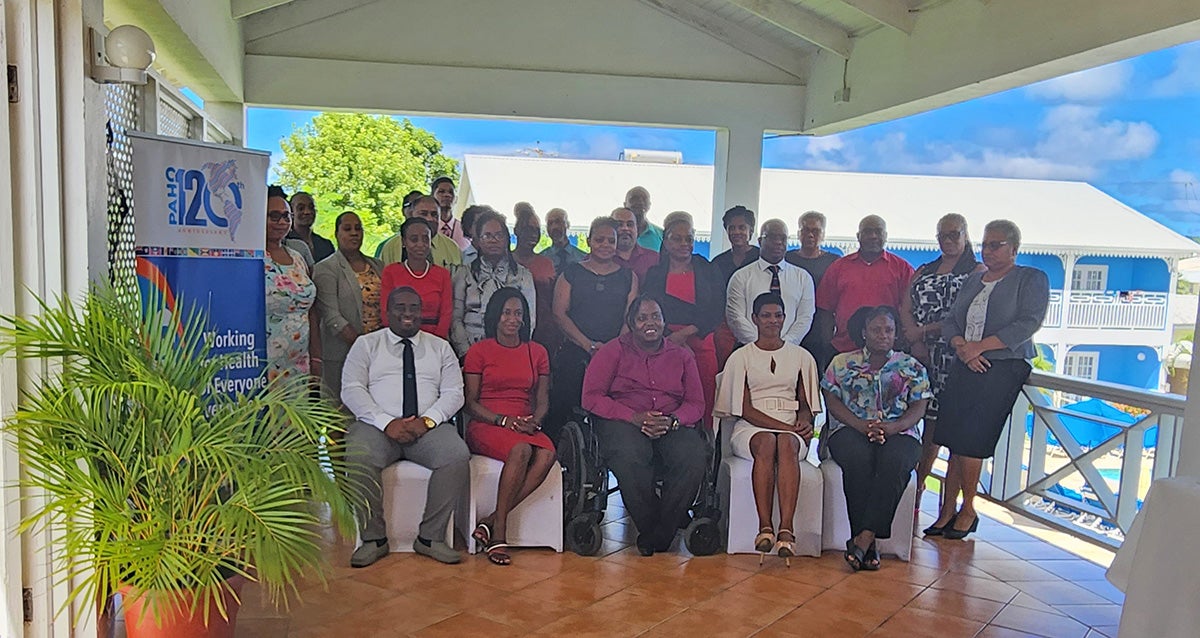
Castries, Saint Lucia, 16 October 2023 (PAHO) - The Ministry of Health, Wellness, and Elderly Affairs (MOHWEA) of Saint Lucia, in collaboration with the Pan American Health Organization (PAHO), convened an Inter-ministerial Climate Change and Health Workshop.
The participants represented a diverse array of stakeholders, including various ministries: the Ministry of Equity, Social Justice, and Empowerment; the Ministry of Finance, Economic Development, and Youth Economy; the Ministry of Agriculture, Fisheries, Food Security, and Rural Development; the Ministry of Public Service, Home Affairs, Labour, and Gender Affairs.
Other agencies included the Water Resource Management Agency (WRMA), St. Lucia Solid Waste Management Authority (SLSWMA), St. Lucia Bureau of Standards (SLBS), St. Lucia Electricity Services Limited (LUCELEC), Water and Sewage Authority (WASCO), National Utilities Regulatory Commission, and the National Emergency Management Organization (NEMO). The St. Lucia Diabetes and Hypertension Association, St. Lucia Blind Welfare Association (SLBWA), St. Lucia Diabetic and Hypertension Association (SLDHA), and the National Council of and for Persons with Disabilities were also represented.
This event marked a significant achievement for the Green Climate Fund (GCF) Caribbean Readiness Project, entitled "Enhancing Climate Change Resilience of Health Systems in Seven CARICOM States." The proceedings commenced with an opening ceremony featuring remarks from Dr. Sharon Belmar – George, Chief Medical Officer of the Ministry of Health, Wellness, and Elderly Affairs; Dr. Taraleen Malcolm, Advisor for Non-Communicable Diseases & Mental Health (ECC), representing Dr. Amalia Del Riego, the PAHO/WHO Representative; and Ms. Tessa Inglis, Deputy Permanent Secretary, representing Ms. Jenny Daniel, Permanent Secretary of the Ministry of Health, Wellness, and Elderly Affairs.
The speakers emphasized that the impacts of climate change transcend borders and disciplines, affecting every facet of our lives. Their message to the stakeholders was clear and unequivocal, underscoring the urgent need to protect public health from the extensive impacts of climate change. They emphasized the critical importance of enhancing and nurturing intersectoral collaboration and synergies to address these challenges effectively.
The workshop sought to facilitate the seamless integration of health considerations into intersectoral actions and policies, emphasizing the imperative to align these considerations with the national climate change agenda. The overarching aim was to mitigate morbidity and mortality in the face of climate-induced threats. In line with this aim, participants were briefed on the project's objectives, intended beneficiaries, expected outputs, and desired outcomes.
The sessions also delved into the intricate relationship between climate change and human health, exploring both direct and indirect impacts, including those mediated through socioeconomic systems. Additionally, the workshop addressed the critical issues related to cross-sectoral collaboration, highlighting its significance, the challenges involved, and interventions required for effective climate change adaptation.
A prominent feature of the workshop was the invaluable insights gathered from the breakout group discussions. These discussions revolved around the central question of how to seamlessly integrate health-related topics into climate change strategies and planning within non-health sectors. Furthermore, the participants engaged in fruitful deliberations to identify opportunities and technical themes that could bolster inter-ministerial climate change committees and working groups.
Collectively, this workshop served as a catalyst for enhancing participants' comprehension of the integration process, inspiring a fundamental shift in their perspective and empowering them to consider the impact of climate change-induced events on health while planning within their respective sectors. Additionally, the workshop was a crucial step toward breaking down the barriers of siloed thinking and fostering robust collaboration.
The high level of participation of this diverse group of stakeholders was a demonstration of the commitment of the Ministry of Health Wellness, and Elderly Affairs in taking actions to adapt to the impact of climate change on health and other sectors.




